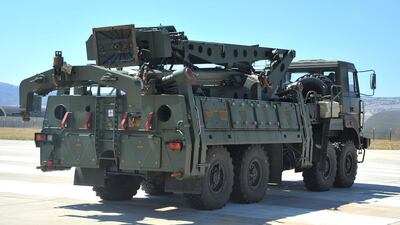Turkey’s reported test of the Russian-made S-400 missile system drew a stern rebuke from the United States – but the Donald Trump administration still has not given any indication that it plans to move ahead with sanctioning Turkey as required by law.
"The United States has been clear on our expectation that the S-400 system should not be operationalised," US State Department spokeswoman Morgan Ortagus told The National. "We have also been clear on the potential serious consequences for our security relationship if Turkey activates the system."
Turkish media outlets with close ties to the government reported that Ankara tested the S-400 missile over the Black Sea province of Sinop. American officials worry that Turkey’s acquisition and use of the system could allow Russia to spy on US-made military hardware.
“If confirmed, we would condemn in the strongest terms the S-400 test missile launch as incompatible with Turkey’s responsibilities as a NATO ally and strategic partner of the United States,” said Ortagus.
The State Department did not clarify whether it would move forward with sanctions on Ankara over Friday’s reported test. US President Trump has so far refused to implement the sanctions stipulated under the 2017 Countering America’s Adversaries Through Sanctions Act despite intense pressure to do so from both Democrats and some of his closet Republican allies in Congress.
Secretary of State Mike Pompeo moved the goalposts for sanctions further back last year after Turkey acquired the S-400 system and tested its Russian-made radar against American-manufactured F-16 and F-4 fighter jets. After the radar test, Pompeo warned Ankara against “full operationalisation” of the S-400 anti-aircraft system.
Greek press reports claimed earlier this month that Turkey once again activated the S-400 radar system in August to track F-16s returning from military exercises that Athens conducted in the eastern Mediterranean with Cyprus, France and Italy. Turkey is embroiled in a heated maritime dispute with Greece and Cyprus over offshore oil reserves off the coast of the disputed island.
The Greek media reports prompted Democratic and Republican senators Chris Van Hollen and James Lankford to press Mr Pompeo to sanction Turkey in a letter.
The senators demanded that the Trump administration sanction Turkey as required under the 2017 law, which mandates penalties on any country that engages in a “significant transaction” with the Russian defence sector.
They also criticised “the slow pace at which the Department of Defence is moving to remove Turkey from the F-35 supply chain.” The United States formally kicked Turkey out of the co-production programme for the F-35 fighter jet last year over the S-400 issue. The US Congress formalised that expulsion into law as part of its annual defence authorisation bill last year.
"Not only is this equipment incompatible with US and NATO systems, it poses a clear threat to the F-35, which is why we have already terminated delivery of the F-35 to Turkey," James Inhofe, the chairman of the Senate Armed Services Committee, told The National.
"It is surprising and even incoherent to see Turkey turning further toward Russia, given the two countries’ starkly opposing policy positions on and troop deployments to Libya, Syria and the ongoing conflict in Nagorno-Karabakh between Azerbaijan and Armenia. Turkey’s reliance on Russia for military equipment undermines, rather than improves, Turkey’s security."
A bipartisan group of lawmakers want to go even further in this year’s defence bill with language clarifying that the president must sanction Turkey for its S-400 purchase.
Republican Adam Kinzinger and Democrat Abigail Spanberger introduced the legislation as an amendment to the House defence bill, which passed 295-125 in July. However, the bill also gives Turkey an off-ramp by authorising the president to remove the sanctions if Ankara gets rid of the S-400 system.
The Senate version of the bill does not contain the Turkey sanctions provision, but Foreign Relations Committee Chairman James Risch, a Republican close to Mr Trump, has introduced identical legislation in the upper chamber. The House and Senate are slated to finish negotiating a compromise defence bill to send to Mr Trump after the US election concludes in November.
Defence News reported in August that the US Congress has already been holding up arms sales to Turkey since 2018 over the S-400 issue.
"A test of the system at this juncture would be deeply problematic," a congressional staffer told The National.


